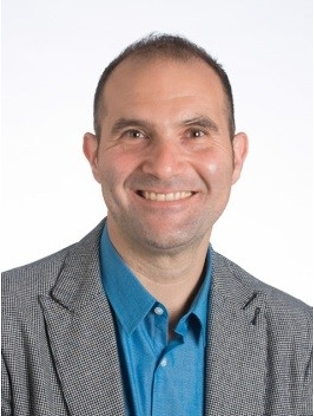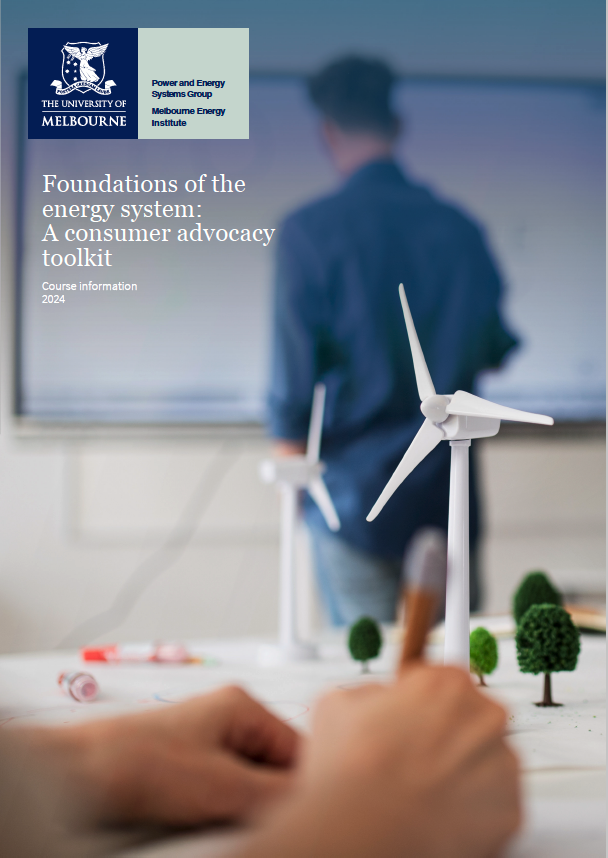Foundations of the energy system: A consumer advocacy toolkit

More Information
Foundations of the energy system: A consumer advocacy toolkit is a free, knowledge-building course that will provide new and existing consumer advocates with foundational knowledge on the ongoing transformation in the energy industry and markets. The course is supported by the Energy Consumers Australia’s Grants Program.
About
Foundations of the energy system: A consumer advocacy toolkit is an interactive, online training course where foundational knowledge of the energy industry and markets will be shared with new and existing consumer advocates.
Who is delivering and supporting the course?
The training will be primarily delivered by Professor Pierluigi Mancarella, from the University of Melbourne and the Melbourne Energy Institute, and other relevant national and international speakers. The course is supported by the Energy Consumers Australia’s Grants Program.
Who should participate?
Anyone who advocates or speaks on behalf of consumers or their community and is passionate about building a more affordable, sustainable and fair energy system. No previous knowledge or experience in energy, engineering or economics is required.
Why should you attend?
At the end of the training, you will have a solid first principles understanding of major socio-techno-economic issues associated with the energy transition. You will also have a basic knowledge of the major decision-making processes to effectively influence government, regulatory and industry policies. You will have an opportunity to actively interact with experts and other consumer advocates, as well as with national and international guest speakers. Together, this will equip you to better advocate for the rights of consumers in the energy system. A certificate of completion will be provided at the end of the course.
What topics will be discussed?
Topics include:
- how to effectively influence major industry, regulatory and government processes;
- major transformations in the energy system and markets, and implications for consumers;
- developments in wholesale and retail markets, and wholesale, network and retail pricing, including opportunities for reforms;
- energy efficiency, decarbonisation of heating and transport, electrification, and impact on consumers that are on electricity and gas networks;
- transformation occurring in distribution networks, and the role, impact and opportunities for consumer energy resources (CER); and
- climate and grid resilience, and opportunities for energy communities and microgrids.
Course delivery
This is a pilot program that will be delivered across eight months. Eight two-hour training sessions will be delivered fully online every three weeks between 29 May and 23 October 2024, and will be complemented by reading material and discussion opportunities. All sessions will be recorded and available at any time and for future knowledge sharing purposes. All lectures and relevant material will be accessible via the University of Melbourne’s Learning Management System “Canvas”. In-person workshops on specific case studies will also take place in late November - early December 2024, depending on the participants’ availability.
Course information
Download the 2024 course guide for more information.
Expressions of interest
Complete the form to register your interest. Applications close 11:59pm on 15 May 2024. Successful candidates will be notified via email.
Please note that spots are limited; we will assess all expressions of interest received and will endeavour to respond as soon as possible if your enrolment is successful.
Presenter and Convener

Prof. Pierluigi Mancarella
Energy Systems Program Leader and Chair of Electrical Power Systems, University of Melbourne
Pierluigi Mancarella is Chair Professor of Electrical Power Systems at the University of Melbourne and Professor of Smart Energy Systems at the University of Manchester, UK. He obtained the PhD degree in Power Systems from the Politecnico di Torino, Italy, did his postdoc at Imperial College London, UK, and has held visiting research positions at Sintef/NTNU in Norway and NREL in Colorado, as well as visiting professorships at Ecole Centrale de Lille in France, the Universidad de Chile, and Tsinghua University in China.
